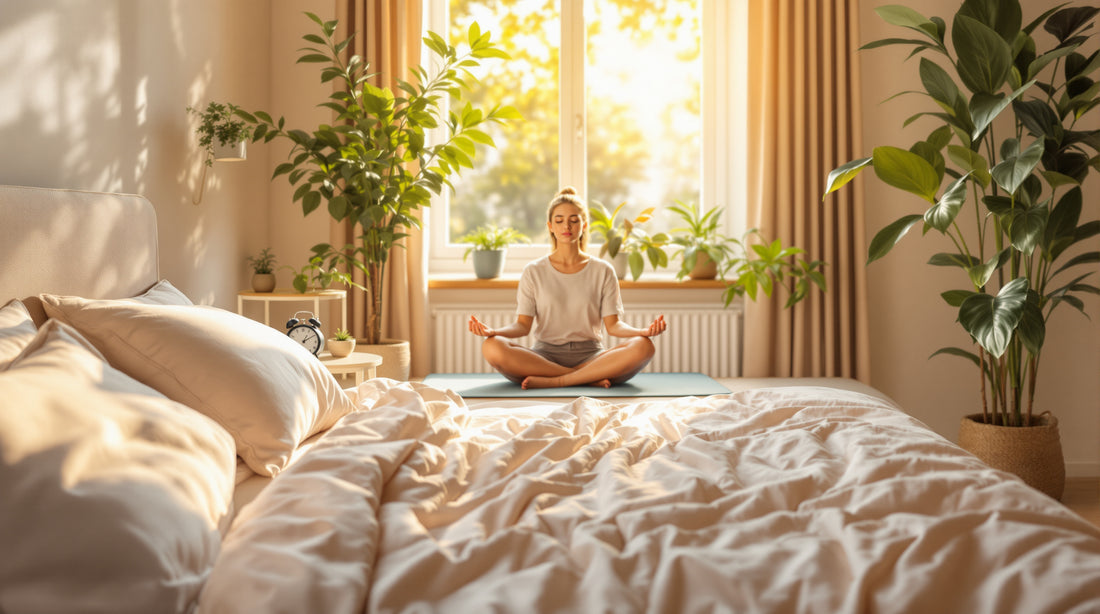Struggling with sleep? Resetting your circadian rhythm can improve your rest and reduce stress. Here's how:
- Stick to a consistent sleep schedule: Go to bed and wake up at the same time daily, even on weekends.
- Get morning sunlight: Spend 15-30 minutes outside within an hour of waking up to sync your internal clock.
- Limit evening light: Dim lights and avoid screens 2-3 hours before bed to boost melatonin production.
- Practice nasal breathing during sleep: Use tools like mouth tape to encourage steady breathing and reduce snoring.
- Time meals and exercise wisely: Finish dinner 3 hours before bed and avoid intense workouts late at night.
How to Reset Your Circadian Rhythm / Body Clock | Sleep Reset
How Stress Disrupts Sleep
Stress can throw off your natural sleep-wake cycle, impacting both how well you sleep at night and how you function during the day. Here's a closer look at how stress affects different stages of sleep and the challenges it brings.
Racing Thoughts at Bedtime
Stress often kicks in at bedtime, sparking racing thoughts and a surge of cortisol that makes it tough to unwind.
Signs that stress is interfering with your ability to fall asleep include:
- Overthinking past events or worrying about future tasks
- Physical tension, like tightness in your shoulders or jaw
- A rapid heartbeat, even while you're lying still
Middle-of-Night Waking
Stress doesn't just make it hard to fall asleep - it can also cause you to wake up during the night, especially in the early morning when sleep is lighter.
What this might look like:
- Waking up with a sense of anxiety that keeps you from drifting back to sleep
- Experiencing physical symptoms like sweating or a racing heart
- Being more sensitive to small noises, which makes staying asleep harder
Next-Day Sleep Effects
When stress disrupts your sleep, it sets off a cycle that impacts your daytime performance. Without proper rest, your body becomes more reactive to stress, making daily challenges feel even harder.
This can lead to:
- Trouble focusing on tasks
- Feeling irritable or short-tempered
- Struggling to make decisions
- Physical exhaustion
- Increased anxiety about getting enough sleep
Breathing through your nose helps regulate oxygen levels and supports better sleep - a topic we’ll dive into in the next section.
3 Ways to Reset Your Body Clock
Your circadian rhythm, or internal clock, is essential for managing stress and ensuring quality sleep. Here are three effective ways to get your body's natural timing back on track.
Fixed Sleep Times
Sticking to regular sleep and wake times helps your body know when to rest and when to wake up, making the process feel more natural.
Here’s how to set a consistent schedule:
- Keep the same sleep and wake times daily, even on weekends.
- Aim for 7-9 hours of sleep each night.
- Allow a 30-minute buffer to ease anxiety about exact timing.
- Start winding down about 90 minutes before bedtime.
Morning Light Exposure
Getting natural light in the morning is one of the best ways to regulate your internal clock. Sunlight signals your brain to reduce melatonin (the sleep hormone) and boost cortisol, making you feel awake and ready for the day.
To make the most of morning light:
- Spend 15-30 minutes outside within an hour of waking up.
- Skip the sunglasses during this time to let the light fully reach your eyes.
While morning light helps reset your clock, the way you handle light in the evening is just as important.
Evening Light Management
Evening light exposure, especially blue light from screens, can interfere with your sleep by suppressing melatonin. Adjusting your evening lighting can improve your sleep quality.
Tips for managing evening light:
- Dim the lights around your home 2-3 hours before bed.
- Use warm, amber-toned lights in bedrooms and bathrooms.
- Switch devices to night mode or warm light settings after sunset.
- Avoid bright screens 60-90 minutes before bedtime.
- Use blackout curtains to create a dark sleep environment.
Sticking to these habits consistently can help reset your body clock. It may take a week or two to notice big changes, but over time, these adjustments can lead to better sleep and reduced stress.
sbb-itb-31084ec
Nasal Breathing During Sleep
Improving your breathing habits can make a big difference in your sleep quality. Breathing through your nose helps keep airflow steady and conditions the air you breathe, which can lead to more restful sleep.
Why Breathing Through Your Nose Matters
Your nose naturally filters, warms, and humidifies the air you inhale. This process helps maintain a steady breathing pattern, which is particularly important while you sleep.
Using lulltape at Night

lulltape is a specialized mouth tape designed to encourage nasal breathing. It uses a gentle, hypoallergenic adhesive to comfortably keep your mouth closed, helping to reduce snoring and improve sleep quality. While products like lulltape can help, making changes to your sleep environment is also important.
Tips for Supporting Nasal Breathing
Set up your bedroom to encourage nasal breathing. Keep the room cool and ventilated to support steady airflow and make it easier to breathe through your nose. These small changes, combined with the sleep routines mentioned earlier, can help you get a more restorative night's rest.
Daily Habits for Better Sleep
Combine the earlier circadian rhythm strategies with these daily routines to improve your sleep quality. Establishing consistent habits can help regulate your body's natural sleep cycle.
Sleep Meditation Tips
Start with 5 minutes of deep breathing exercises. Follow this with progressive muscle relaxation to release tension. Meditate in dim lighting about 30 minutes before going to bed. Keep your meditation space cool (between 65-68°F) and free from distractions to create a calming environment. Pairing these practices with regular exercise can further support your sleep cycle.
Exercise Timing
Schedule exercise 4-6 hours before bedtime. A brisk 20-minute walk in the morning sunlight can also help align your body clock. Avoid intense workouts within 2-3 hours of bedtime, as they can raise your body temperature and make falling asleep more difficult. Properly timed exercise helps reinforce a consistent sleep routine.
Meal Timing
Finish your last substantial meal at least 3 hours before bedtime. For example, if you aim to sleep at 10:00 PM, eat dinner by 7:00 PM. If you need a light snack later, consider options like:
- Complex carbohydrates
- Foods rich in magnesium
- Lean protein
Avoid caffeine after 2:00 PM, and limit fluids in the two hours before bed to prevent disruptions during the night. Aligning your meal timing with your sleep and exercise schedule supports a healthier sleep pattern.
Conclusion
Syncing your daily habits with your body’s natural rhythm can lead to better sleep and less stress. Getting sunlight in the morning helps set your internal clock, and sticking to regular sleep times strengthens these natural cycles.
Key practices include nasal breathing, which enhances sleep quality. Tools like lulltape can encourage this habit while you sleep. These approaches work together to create the foundation for better rest.
Exercising earlier in the evening, eating meals at consistent times, and practicing relaxation techniques like meditation in a cool space are all ways to prepare your body for deep, restorative sleep. Each of these habits supports your body’s natural rhythm.
Start small - try setting a fixed bedtime and incorporating nasal breathing. Gradually add more habits over time, and you’ll build a routine that improves both your sleep and overall well-being.



